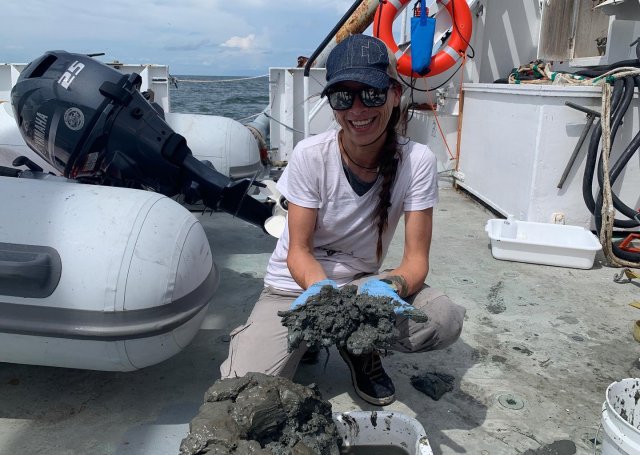Meet EPA Researcher Jenny Paul, Ph.D.

Jenny Paul is a benthic ecologist meaning she studies life at the bottom of a body of water. Jenny works with invertebrates that live in soft sediments of the northern Gulf of Mexico. Her team uses benthic invertebrates as bioindicators because they can tell us a lot about the habitat conditions of where they live. As such, they are an integral component of most aquatic monitoring programs like the EPA’s national aquatic resources survey (NARS).
What research are you working on right now?
Traditionally, EPA’s national aquatic resources survey (NARS) requires collecting and identifying benthic invertebrates under a microscope which takes a long time. To reduce wait time, my team is developing rapid assessment tools like sediment profile imaging (SPI) and sediment surface imaging (SSI) which capture different images of the seafloor, and molecular taxonomy through DNA metabarcoding. By giving managers different perspectives of the benthos, it is easier to link specific actions to habitat improvements and improve the way we take care of our oceans.
What is your education/science background?
I started out working in freshwater and have had the opportunity to work in some of the most pristine and polluted rivers and streams on the planet through graduate research. I joined EPA in January 2021 as an Oak Ridge Institute for Science and Education (ORISE) post-doctoral fellow with a dual appointment at EPA’s Gulf of Mexico Division and the Gulf Ecosystem Measurement and Modeling Division where I work in estuaries and coastal habitats of the northern Gulf of Mexico.
When did you first know you wanted to be a scientist?
I am fortunate in that I have always known that I wanted to work with animals, although I stumbled into invertebrates during college. Like anything, the more you learn about something the more you come to care about it. The more I learned about benthic invertebrates and their role in the ecosystem the more committed I became to a career working with them.
What do you like most about your research?
Some people pay a lot of money to be covered in mud, I get to do it for free!
How does your science matter?
It’s easy to feel powerless against the weight of environmental challenges. The tools we are developing give researchers and natural resource managers the ability to combat some of the biggest problems facing estuaries and coastal communities, like pollution and climate change, and that’s empowering.
If you weren’t a scientist, what would you be doing?
In an alternate universe, there is probably a version of me that is a diving guide. You can usually find me underwater when I’m not at my computer so it’s not hard to imagine doing more of that.
What advice would you give a student interested in a career in science?
The best advice I can give is to follow opportunities as they present themselves, it’s OK if you don’t exactly know what you are going to do in your career when you are starting out. Follow things that interest you because you might find you like something you didn’t even know existed before.
What do you think is our biggest scientific challenge in the next 20/50/100 years?
Science has the ability to solve every environmental problem we are facing. The biggest challenge for science is in gaining support for the solutions, which traditionally have been met with strong pushback. Community engagement and outreach communication are some actions we can take as scientists, but I also believe science needs to take a larger role in political discussions.
Editor's Note: The opinions expressed herein are those of the researcher alone. EPA does not endorse the opinions or positions expressed.
